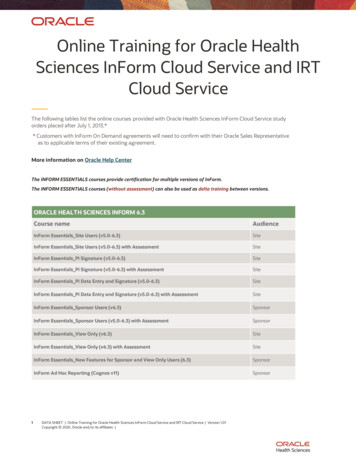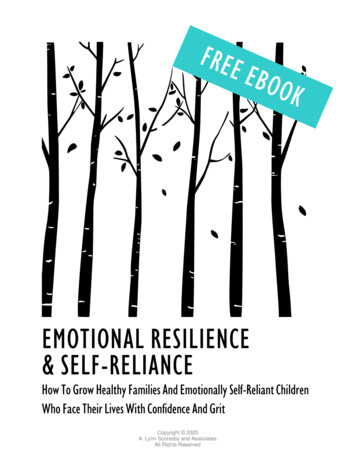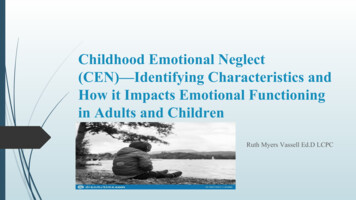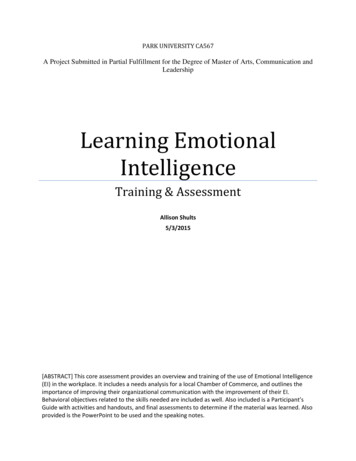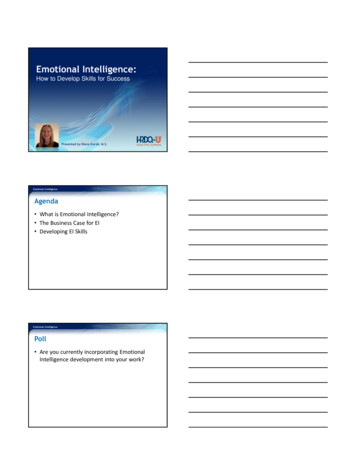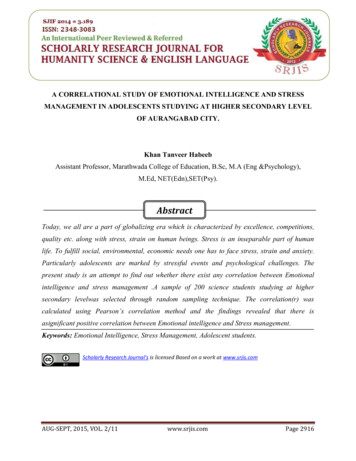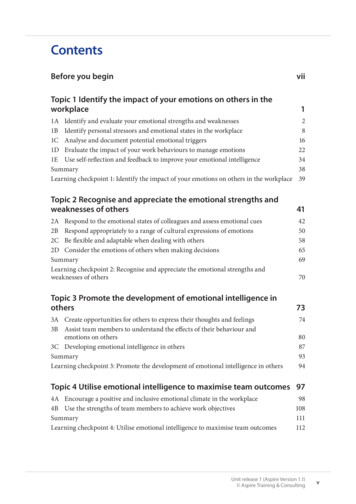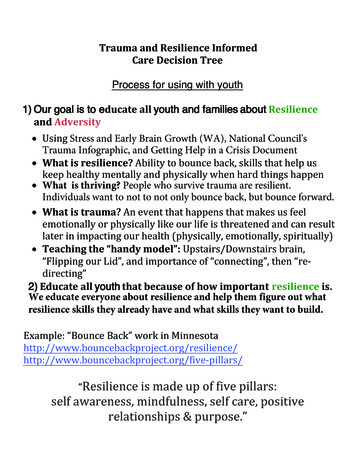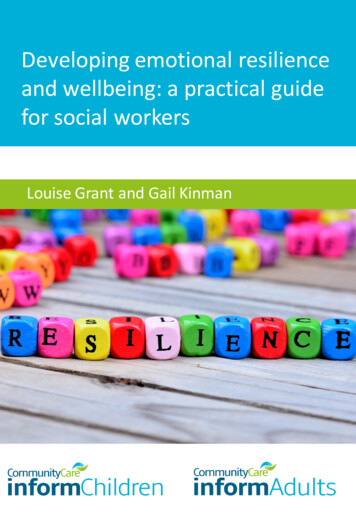
Transcription
Developing emotional resilienceand wellbeing: a practical guidefor social workersLouise Grant and Gail Kinman
IntroductionThe coronavirus (Covid-19) pandemic has created unprecedented challenges for socialwork. At the time of publishing this guide, practitioners are concerned about their lack ofpersonal protective equipment putting service users at risks, as well as themselves andtheir families. They are also telling Community Care about difficulties managing workwhen colleagues are self-isolating or sick. The worries being voiced most loudly are aboutthe impact on vulnerable children and adults. Domestic abuse, child maltreatment andmental health problems could be worsened by the crisis, and meeting the care andsupport needs of disabled and older people must be managed while adhering togovernment guidance on social distancing. In this rapidly changing landscape, we knowthat different pressures may emerge in the coming weeks.At Community Care Inform, we are working to do all we can so that our online resourcescan provide maximum support to social work teams in our subscribing local authoritiesand other organisations*. We also want to thank all social work and care staff for theincredible work that you continue to do, providing vital help to people in need of care,support and protection. Looking after your own wellbeing is always essential in thestressful jobs you do, but never more crucial then when you are under extra strain.This is why we have made our guide to developing emotional resilience and wellbeingfreely available to everyone. It’s a comprehensive guide, based on what research sayssupports resilience in social workers and is full of information and ideas to use in yourpractice. If you are pushed for time and want to jump straight to techniques and tools totry, go to the final section: What can I do to enhance my resilience? (page 17).The Community Care Inform TeamAccessing further resources on Community Care Inform*A large number of local authorities and universities work with us so ask your manager,principal social worker or learning and development team if you already have access, orcontact our helpdesk. Independent or agency workers can also enquire about individuallicences. Tel: 0202 915 9444 Email: ccinformhelpdesk@markallengroup.com.During this pandemic we are regularly updating our legal coverage of the CoronavirusAct 2020 and its implications for other legislation, and our links to useful resources forsocial workers practising during the outbreak. You can also find practice guidance,learning tools and legal information on a wide range of topics from attachment theoryto criminal exploitation, deprivation of liberty to self-neglect. Click on the logo relevantto the service you work in to find out more.
Resilience and thecoronavirus pandemic: amessage from the authorsContentsIntroductionOrganisational resilienceWhy is it important to beresilient?457The underlying competenciesEmotional literacy8Reflective thinking skills9Empathy10Social competence11Social support11Supervision andorganisational support12Optimism and hope13Coping skills and flexibility 14Self-compassion andself-care16What can I do to enhance myresilience?Mindfulness and relaxation 18Thinking skills (cognitivebehavioural techniques19Preparing for supervision 20Peer coaching for support 21Self awareness andaction planning22References23Louise Grant is interim executivedean of health and social sciences atthe University of Bedfordshire. Herresearch has focused on supportingsocial workers to manage thecomplex nature of their work, andlatterly on strategies to buildorganisational resilience.Gail Kinman is an occupationalhealth psychologist and visitingprofessor at Birkbeck, University ofLondon. Her research interestsencompass work-related stress,work-life balance, emotional labour,emotional intelligence and wellbeing.Part of being a social worker is to beresilient, dedicated, compassionate,calm and resourceful. During thecoronavirus epidemic social workerswill need to draw on these skills andqualities even more than usual.But they must also be supportedby a system that provides themwith a secure base, appreciatestheir efforts, provides adequateresources, prioritises learningand, above all, supports theirwellbeing.Organisations that are resilient will bebetter able to manage the shocks andchallenges to the system created bythe current pandemic.Although how social workers respondto the current situation will varyaccording to their individualcircumstances, it is crucial to practiseself-care and self-compassion. In otherwords, you need to be asunderstanding and caring towardsyourself as you are to other people.Prioritising your own wellbeing isnot selfish but vital if you aregoing to be able to sustain bestpractice in these difficult times.We hope that our guide to emotionalresilience will help support socialworkers during this challenging periodbut we urge organisations to wrapsupport around their workers; this iscrucial no matter how resilient we orothers think we are.Louise Grant and Gail Kinman,Spring 2020
What is emotional resilience?Emotional resilience has become a buzzword in the helping professions.Although resilience has been incorporated into the “official discourse” ofsocial work, it is important to consider: What does resilience mean? To what extent do we as social workers need to be resilient? Can resilience really protect our wellbeing and improve our professionalpractice? Perhaps most importantly, how can we build our resilience to help usthrive in a profession that, although rewarding, can be very stressful?This evidence-based resource aims to provide some guidance to help younavigate your professional journey. Based on our own research and that ofothers, we highlight the importance of emotional resilience in protectingyour personal wellbeing and enhancing your professional practice andsuggest ways to help you develop this important quality.‘An evolving concept’Due to the challenging and complex nature of the job, social workers, likeother “helping” professionals, are at high risk of stress and burnout. It istherefore crucial to develop effective coping skills and strategies. There isevidence that emotional resilience can not only protect social workers fromthe adverse effects of work-related stress but also help you flourish in theprofession and ensure the best possible outcomes for service users. Thisguide considers the meaning of resilience, highlights the factors thatunderpin this key quality and identifies how they can be developed.Emotional resilience is a complex, multi-dimensional and evolving concept.Many definitions have been provided, but they typically refer toresourcefulness, flexibility, effective coping and the ability to “bounce back”from life’s difficulties. For example, Pooley and Cohen (2010) definedresilience as “the potential to exhibit resourcefulness by using availableinternal and external resources in response to different contextual anddevelopmental challenges”.4
Our literature review found resilient people have somecommon attributes: Self-efficacy and self-esteem.Enthusiasm, optimism and hope.Openness to experience.A positive self-concept and a strong sense of identity.An internal locus of control (where an individual attributes success to theirown efforts and abilities) and a high degree of autonomy.Self-awareness and emotional literacy.Self-compassion and the ability to prioritise self-care.Critical thinking skills.The ability to set appropriate boundaries.Well-developed social skills and the social confidence to develop effectiverelationships with people from different backgrounds.Flexibility and adaptability, drawing on a wide range of coping strategiesand creative problem-solving skills.The ability to recognise and draw on one’s unique pattern of internal andexternal resources.The ability to identify and draw on sources of support.Persistence in the face of challenges, setbacks and adversity.A sense of purpose and the ability to derive a sense of meaning fromdifficulties and challenges.The ability to learn from experience.An orientation towards the future.A sense of humour.Emotional resilience is not simply a quality of the individual, but a dynamicinterplay between personal characteristics and supportive externalfactors. Our own research shows that social workers who are moreresilient are those who can maintain positive relationships in their personaland working life, access support from a range of sources, demonstrateappropriate empathy, draw on a range of coping styles, and successfullymanage and contain their own and others’ emotions.More resilient social workers are also able to set firm physical and emotionalboundaries between the work and home domains, reflect constructively ontheir practice and derive a sense of meaning from the challenges they face.This does not mean that resilient social workers are super-human and freefrom life’s difficulties. They face the same problems as others but tend tomanage setbacks constructively and persevere in the face of difficulties.Resilient people also experience negative feelings, such as frustration,anger and anxiety, but balance them with positive experiences andemotions and put any “failures” in perspective. Over time, these positiveexperiences and emotions broaden and build personal resources ratherthan depleting them, thus leading to resilience. Resilience is also selfsustaining: for example, flexibility and self-compassion will help youdevelop other skills and resources.5
Organisational resilience andemployers’ responsibilitiesThis resource focuses on individual approaches to enhancing resilience, butthis is only one element of a systemic approach to supporting staffwellbeing. It is generally agreed that social workers have someresponsibility for protecting their wellbeing in what can be a highly stressfuljob.Although there is evidence that emotional resilience can be helpful, eventhe most resilient social workers will be unable to manage, let alone thrive, intoxic working conditions.Employers have a legal and moral responsibility to safeguard the wellbeingof their staff. The risk that resilience can be used to divert attention fromthe structural and organisational sources of stress towards buildingindividual capacities is widely recognised (Grant and Kinman, 2014). Thereis also the potential for social workers who are unable to cope withincreasing work demands and diminishing resources to be blamed forbeing insufficiently “resilient”.We have developed a model that reflects the need for a more systemicapproach to supporting resilience in social work (see below and also seeGrant and Kinman, 2016 for an explanation). Our work focuses on buildingresilience at an organisational as well as an individual level, viainterventions that aim to foster resilient social work teams and resilientleaders (see figure).The UK Health and Safety Executive provides an evidence-basedframework for employers to help organisations diagnose and manage keyworkplace stressors (such as demands, control and support). They havealso developed a tool to enable managers to assess whether they currentlyhave the behaviours identified as effective for preventing and reducingstress at work.6Right: a model forsupporting resilience insocial work
‘Ordinary magic’In conclusion, there is no great mystery to resilience. It is not an innatecharacteristic or personality trait, nor is it a lucky charm that protectspeople from all ills. Ann Masten, a professor of child psychology at theUniversity of Minnesota, calls resilience, “ordinary magic” (2009).It typically arises from effective adaptation to everyday events rather thanunusual ones, and emerges from ordinary human capabilities, relationshipsand other internal and external resources. Our research has also foundevidence that resilience can be enhanced via the development of the keycharacteristics that underpin this important quality. This is discussed morelater in this resource after we consider the importance of resilience forsocial workers.Why is it important tobe resilient?Social work is a rewarding but stressful occupation. It is crucial to manageworkplace stress effectively as it is closely linked with a range of physicaland mental health problems, impaired work performance andabsenteeism. A survey of social workers published in 2018 by the BritishAssociation of Social Workers highlighted increasing workloads andgrowing levels of stress. UK social workers also appear to be at greater riskof burnout than many other professional groups. A survey of 1,000 socialworkers conducted by Unison in 2019 reported that less than 20% ofrespondents found their workloads manageable and more than half (56%)were considering leaving the profession for a less stressful job. The findingsof BASW survey found that 61% of a sample of 3,000 were consideringleaving, an increase of nearly 10% from the previous year.The need for social workers to develop the resilience required to help themmanage stress effectively and provide a high quality service is widelyrecognised. It is now also recognised that social workers and those intraining need to demonstrate that they are emotionally resilient, able toprotect their own personal wellbeing, and capable of adapting to thechanging demands of the job. Clearly, resilience is a key quality for the job7
but serious concerns have been expressed that many social workers arenot sufficiently resilient to survive in their career. It is therefore importantto identify ways to help enhance resilience in the profession.Developing emotional resilience will help social workers adapt positively todemanding working situations and enhance their professional growth. Theconcept of resilience might also help to explain why some practitionerswho experience high levels of stress at work not only fail to burn out, butmay even thrive enabling them to manage future challenges moreeffectively. Our own research indicates that the benefits of resilience arewide-ranging: more resilient social workers are more mentally andphysically healthy, experience less stress, and use more adaptive copingstrategies. There is also some evidence that more resilient social workersmay have better relationships with service users, so enhancing theirprofessional practice.Resilience – the underlyingcompetenciesTo help social workers and their employers develop their emotionalresilience, several competencies have been identified in theresearch. These are outlined in turn in the sections below. Whererelevant, some guidance is provided to help develop thesecompetencies, but more focused interventions are described later.Emotional literacy (or emotional intelligence)This is defined broadly by Goleman (1996) as “being able to motivateoneself and persist in the face of frustrations: to control impulse anddelay gratification; to regulate one’s moods and keep distress fromswamping the ability to think; to empathise and to hope”. Emotionalliteracy has two components: interpersonal (social intelligence) andintrapersonal (self-awareness). Interpersonal emotional literacy helpspeople relate effectively to others and achieve instrumental goals,whereas intrapersonal emotional literacy encompasses the extent towhich people attend to their feelings, the clarity of these experiences,and how well they can “repair” negative mood states or prolong positiveones. Awareness of the role played by emotional states in decisionmaking is also a key aspect of emotional literacy and this is particularlyrelevant to social work.
The capacity to manage our own emotional reactions and those of otherseffectively, often in challenging care environments, is central to social work.Morrison (2007) has highlighted the relevance of emotion managementskills to key social work tasks such as engaging users; assessment andobservation; decision making; collaboration and co-operation; and dealingwith stress. Our own research has found that emotional literacy is one ofthe most important factors underpinning resilience in social workers(Kinman and Grant, 2010). We found that those who are more adept atperceiving, appraising and expressing emotion, who can understand,analyse and utilise emotional knowledge, and who are able to regulatetheir emotions effectively are not only more resilient to stress, but morementally and physically healthy.Research findings suggest that people who are more emotionally literateare typically more enthusiastic, optimistic, confident, trusting and co operative – all desirable attributes for social workers. Emotional literacy hasimportant implications for job performance, as it tends to foster effectivedecision-making abilities as well as communication skills. A social workerwhose emotional literacy skills are under-developed may have problemsdeveloping “appropriate” empathy, escalate conflict by reciprocating in kindwhen faced with hostility and lack of co-operation, or allow emotions tounconsciously influence decision making. They may attempt to “repair”negative mood states by “self-medicating” through comfort eating ordrinking alcohol to excess. Insight into how emotional literacy can beenhanced is therefore vital for practice as well as personal wellbeing.Reflective thinking skillsBy encouraging insight into practice, personal reflection enhancesprofessional development and, in turn, improves the service we provide.Reflection helps workers consider how to adapt practice to individualservice users’ needs and develop solutions to apparently intractableproblems. The development of reflective thinking skills can also help socialworkers explore the dynamics of rational and irrational thoughts, emotions,doubts, assumptions and beliefs and the ways in which they have animpact on their practice.Based on research with medical practitioners conducted by Aukes et al(2007), we found it useful to examine three interlinked elements ofreflective thinking: Self-reflection (“I want to know why I do what I do”). Empathetic reflection (“I am able to understand people from differentcultural and religious backgrounds”). Reflective communication (“I am open to discussion and challengeabout my opinions”).9
There is evidence that social workers whose reflective abilities are morehighly developed tend to be happier. Our own research has shown thatreflection is an important self-protective mechanism for social workers, asthose who are better able to reflect on their thoughts, feelings and beliefs,who are able to consider the position of other people, and who can usetheir reflective abilities to communicate effectively with others were moreresilient to stress and more mentally and physically healthy.EmpathyEmpathy is a fundamental component of all helping relationships Whileempathy is essential to forging effective relationships between socialworkers and service users, the job role frequently requires them todevelop and cultivate empathy in other people. Early conceptualisationsof empathy tended to see it simply as the ability to walk in otherpeople’s shoes – to take their perspective in order to understand theirfeelings, thoughts or actions.We have found that multi-dimensional models of empathy are moreuseful as they encompass empathetic concern (feelings of warmth,compassion and concern for others) and personal distress (feelings ofanxiety and discomfort resulting from the negative experiences ofothers) as well as perspective taking (adopting the positions of others.This approach acknowledges that empathy is complex and does notalways have beneficial effects .Our research has provided some insight into the role played by empathy insupporting the resilience and wellbeing of social workers. Empatheticconcern appears to enhance emotional resilience, whereas empatheticdistress tends to diminish it and is likely to have negative effects on mentalhealth more generally (Grant, 2014). This suggests that a certain degree ofempathy can benefit wellbeing, but over-empathising with service userscan lead to over-involvement and increase the risk of burnout.“Appropriate” empathy is therefore vital for social workers to make genuineattempts to acknowledge and accept what their service users think andfeel. Nonetheless, it is vital for staff to develop clear emotional boundariesto ensure that healthy empathetic concern does not spill over intoempathetic distress, which will have negative implications for their serviceusers as well as themselves. It should be acknowledged though thatemotional boundaries should be sufficiently flexible to allow feelings toflow in and out, otherwise you are unable to develop empatheticconnections with others.
Social competenceLike other professionals, social workers need well-developedcommunication skills, social confidence and the ability to be assertive whenrequired. There is a general assumption that members of the helpingprofessions are “naturally” highly socially skilled, so little training isavailable. Nonetheless, our research (Grant and Kinman, 2014) foundconsiderable variation in levels of social confidence among social workerswhich suggests that some may need help to enhance their social andcommunication skills.Social workers are often faced with challenging interpersonal situations butbeing well prepared can improve their self-confidence and communicationskills, enabling them to feel stronger and more comfortable. Role playduring supervision or with a peer can help you prepare for unfamiliar orpotentially difficult situations (such as emotionally challengingconversations with service users or court appearances) and enable you topractise authoritative but empathic responses more generally.Acting out potentially difficult scenarios in a safe environment helps develop acompassionate but authoritative approach and improves self -confidencewhen handling real-life situations.It also provides important information about how other people mayrespond to us in situations and the strategies that may be most (and least)productive.Social confidence is a key factor in developing emotional resilience andsupporting effective relationships with service users. It also helps usdevelop strong and supportive social networks with colleagues, friends andfamily, which is also another element of emotional resilience.Social supportSocial support refers to positive psychosocial interactions with others withwhom there is mutual trust and concern. There is strong evidence thatpeople with more social support tend to be less stressed and morephysically and psychologically healthy – indeed research findings indicatethat loneliness is as detrimental to health as smoking 15 cigarettes a day(Holt-Lunstad et al, 2015). Mutually supportive relationships also fosterfeelings of connectedness, belonging, and empathy with others, allimportant qualities for social workers.Social support can come from many sources, such as peers, colleagues,family and friends, and pets, as well as membership of associations andclubs and wider community ties. Social support comes in many guises, suchas emotional support (esteem, attachment and reassurance), informationalsupport (the provision of advice, guidance and feedback), companionship (asense of belonging) and instrumental support (tangible help and financialassistance). Relationships with family and friends are important resourcesto help social workers manage the emotional impact of their work.Fostering mutually supportive relationships from within your personal and11
professional networks is also beneficial as co-workers are better able tounderstand the trials, tribulations and rewards of social work and canreinforce the value of the work you do. Peer relationships can also provideyou with alternative perspectives and options for solving problems thatmay initially seem to be intractable.An important part of the social work role is to support service users.Although this can enhance your wellbeing and build confidence, it can beemotionally draining and lead to burnout. In terms of your own socialsupport, it is important to recognise that people with very wide socialnetworks may not necessarily receive support, as their relationships maybe superficial, or the support could be one-sided. A key skill is the ability toidentify the type of support you need and where it can best be found. Forsupport to be truly beneficial it must closely “match” what you need at thetime. For example, people may require informational support (such asadvice or guidance) to resolve an issue of concern but instead be offeredemotional support (such as sympathy or nurturing). This may help themmanage distress initially but not solve the problems that actually caused it.Supervision and organisational supportTo build and maintain emotional resilience, social workers not onlyrequire informal social support, they also need formal support throughsupervision and from the wider organisation. There is strong evidencethat supervision, provided on a regular basis within a mutually trustingrelationship, is an effective source of support for social workers.While supervision is not therapy or counselling and cannot addressdeep-seated psychological problems, it is an appropriate environment todiscuss the range of emotions that social work practice can invoke and,in turn, foster emotional literacy and resilience.Social workers frequently experience strong emotional reactions to serviceusers’ negative or traumatic experiences. They may experience anxiety, feelemotionally manipulated and/or over-empathise with service users. Therole of supervision in exploring and making sense of conflicting emotionalreactions and enhancing social workers’ emotion management skills is wellrecognised. To maximise its effectiveness, reflective supervision shouldcreate a “safe space” for emotional thinking and reflection about ethicaland practice-related issues, and conditions where practitioners can benurtured and helped to flourish. Nonetheless, it is important to recognisethat social workers may feel unable to explore their emotional reactions,and there may be barriers to the genuine expression of feelings by thesupervisee and also by the supervisor.12
Supervisees may believe that emotional disclosure is not appropriate insupervision, which can encourage a task-orientated perspective, or fearbeing judged as weak or vulnerable. In turn, the supervisor may worryabout being overwhelmed and concerned that they will be unable tomanage or contain the feelings expressed. For reflective supervision to beproductive in enhancing resilience and professional practice, social workersneed to develop self-awareness to manage these barriers effectively.Optimism and hopeThere is evidence that optimisticpeople are more resilient, healthierand happier than pessimists (Chang,2001). Optimism is generally seen as astable disposition underpinned by theexpectation that more good things willhappen than bad, whereas theopposite is true for pessimism. It maybe more useful, however, to seeoptimism and pessimism asexplanatory styles or biases thatinfluence how people interpret events.Personality traits are generally seen as stable ways of seeing the world,oneself and other people, but explanatory styles are more amenable tochange. A person with an optimistic explanatory style will see themselvesas responsible for positive events occurring (internal), will think that morepositive things are likely to happen in the future (stable) and will believethat other aspects of their life will also be positive (global). On the otherhand, optimists tend to see negative events as untypical (isolated) andirrelevant to other aspects of their life or future events (local). For example,if an optimistic social worker is promoted, they are likely to see this as areward for good work (internal) and think they will receive recognition fortheir hard work in the future (global and stable). If they are not promoted,they will typically attribute this to extenuating circumstances (external) orbecause they need to work on enhancing their skills (internal) but feel ableto improve their performance in the future.Pessimists have a negative explanatory style, in that they tend toaccentuate the negative and minimise the positive. A pessimist ishampered by self-doubt and negative expectancies about the world andother people; when positive events occur, they will see them as flukes(local) caused by luck or circumstances outside their control (external) that20
are unlikely to occur again (unstable). Alternatively, pessimists believe thatnegative events are caused by them (internal), that more mistakes willoccur in future (stable) and this is outside their concontrol (global). Forexample, if a pessimistic social worker had a negative experience with aservice user, they will typically blame this on their poor performance, thinkthat they will let down all other service users in the future, and that theyare clearly unsuited to the job. It is also common for pessimists to overlookopportunities that present themselves, as they fail to recognise them assuch.Pessimism can also be used as a coping mechanism by anxious people.Defensive pessimists tend to lower their expectations to help them manageanxiety, fear and worry in order to help them work productively. Theycarefully review all of the negative things that might happen, preparingthemselves for the worst case scenario. This can be a useful copingstrategy as it helps reduce their anxiety so that they can plan and acteffectively. However, if defensive pessimists try to raise their expectations,or avoid considering worst case scenarios, their anxiety can increase andtheir performance suffer.Social work is generally an optimistic and positive profession. A strong beliefin people’s abilities to change is central to practice, as is striving to empowerservice users to find solutions to their problems.As mentioned above, an optimistic outlook is a key element of resilience.Optimism can be enh
Emotional resilience is a complex, multi-dimensional and evolving concept. Many definitions have been provided, but they typically refer to resourcefulness, flexibility, effective coping and the ability to "bounce back" from life's difficulties. For example, Pooley and Cohen (2010) defined
